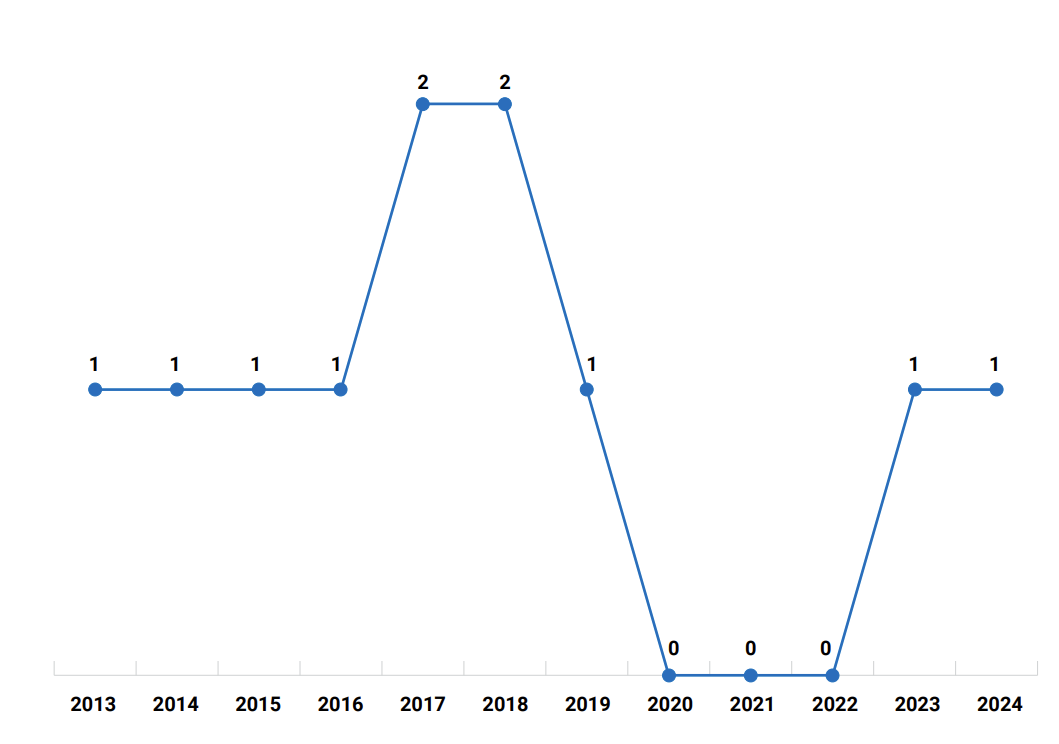In 2024, the Competition Authority focused on determining the competitive situation in the waste transport market. In recent years, the Authority has repeatedly dealt with complaints related to waste transport. For example, market participants have pointed to problems in the organisation of waste transport procurements, while waste holders are often concerned about the deteriorated quality of waste transport services and unreasonably high prices for additional services. Over the past decade, the Authority has conducted numerous supervisory proceedings regarding unfair pricing of additional services in waste transport. The figure below shows that from 2013 to 2024, the Competition Authority has processed an average of 1–2 such cases per year.

Last year, the Competition Authority also found that Eesti Keskkonnateenused AS had set unreasonably high prices (also known as excessive pricing) for additional services related to waste transport in 17 waste collection regions. During the supervisory proceedings, the Authority examined an additional service – manual transport of a container over a distance of more than 10 metres. The proceedings revealed that the price of the additional service included costs, such as alleged lost revenue, that were neither necessary nor justified for the provision of this additional service. The price of a service provided by an undertaking holding a dominant market position must be in reasonable proportion to the costs necessary to provide the service, which means that it must only include justified costs and profitability. Therefore, the Competition Authority found that this was a case of unfair pricing within the meaning of clause 1 of § 16 of the Competition Act and issued a precept requiring the reduction of the price of the additional service. Eesti Keskkonnateenused AS contested the Authority’s precept in the administrative court, with the litigation set to continue in 2025. Continuous problems with the pricing of additional services related to waste transport and the general dissatisfaction of market participants with the waste transport service indicated that the relevant market requires greater attention from the Competition Authority. At the beginning of last year, the Authority began analysing the competitive situation to better understand the functioning of the organised waste transport market, identify possible distortions of competition, and propose measures to enhance competition. In addition, the analysis aimed to support the implementation of the waste reform initiated by the Ministry of Climate in 2024.
The Authority published the analysis and recommendations on its website on 18 November 2024.
In summary, the analysis showed that the competitive situation in the waste transport market has deteriorated – the market has become increasingly concentrated and the number of undertakings participating in waste transport procurements has decreased. Strong price pressure, increased business risks and uncertainty in the waste sector negatively affect waste transport operators’ interest in participating in public procurement. The general decline in profitability of the entire waste management market also indicates possible price pressure in waste transport procurements, as a result of which undertakings might not always make balanced bids in procurements. It also became apparent that requesting a price increase for waste transport services after public procurement continues to be a common practice across Estonia. Over the past five years, local governments have changed more than a third of the concession agreements they have concluded. From a competition perspective, it should be considered problematic that an undertaking can mitigate significant business risks after the public procurement process has been completed. In addition, it places other undertakings participating in the public procurement at a competitive disadvantage.
Following the analysis, the Competition Authority submitted proposals to city and rural municipality governments and local government cooperation organisations to make waste transport procurements more transparent and to enhance supervision in the sector. The recommendations included, among other things, reviewing and updating procurement specifications and procurement conditions for waste transport procurements, clearly regulating the conditions for amending procurement contracts and requesting price increases, rejecting unjustified price change requests, regulating the prices of additional services in procurement specifications, and enhancing supervision over the activities of both waste transport operators and local government cooperation organisations.
The recommendations were sent to 79 local governments (including cooperation organisations), and 65 of these informed the Authority of the measures taken or the implementation of the recommendations. The Competition Authority’s analysis also coincided with the waste reform being carried out by the Ministry of Climate, which aims to improve the recycling of municipal waste. Since the waste reform also directly affected the competitive situation in the waste management market, the Authority analysed the possible impact of the reform on competition and submitted its proposals to the Ministry of Climate during the consultation stage of the draft waste reform. The recommendations included, among other things, conducting separate procurements for waste transport and for waste treatment, settling the costs of organising waste management and managing customer service through local government units, and maintaining the ban on insider trading in the sector.
